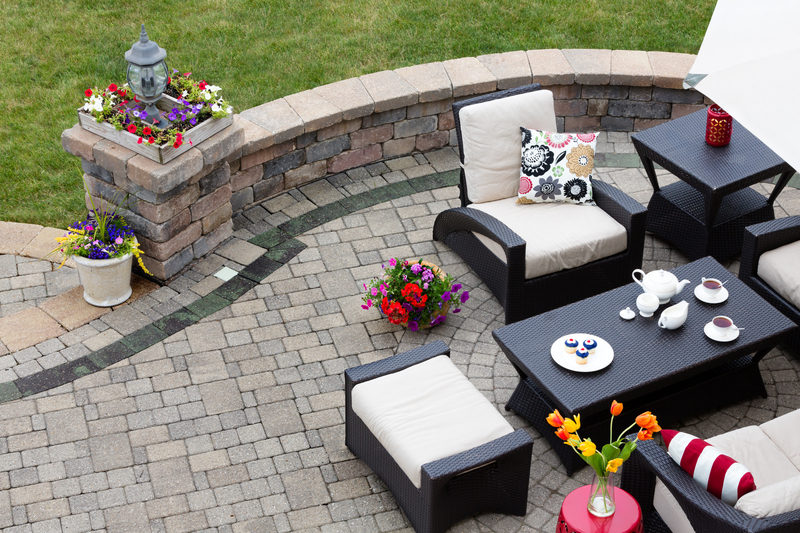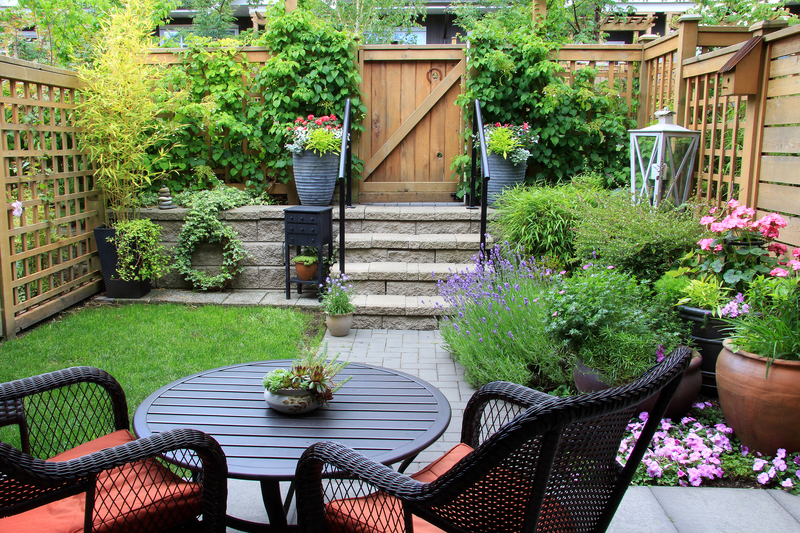Transform Your Outdoor Area with Serene Zen Garden Ideas
Posted on 20/09/2025
Transform Your Outdoor Area with Serene Zen Garden Ideas
Are you searching for a way to infuse tranquility and beauty into your outdoor space? Look no further than the timeless elegance of a Zen garden. Also known as a Japanese rock garden or "karesansui," a Zen garden creates a harmonious, minimalist setting that encourages relaxation, meditation, and a deep connection with nature. In this comprehensive guide, we'll explore the essential elements, practical tips, and inspiring ideas to transform your outdoor area into a peaceful Zen garden sanctuary.
What Is a Zen Garden?
Zen gardens originated in medieval Japan, designed as spiritual retreats for Buddhist monks. Their purpose was to provide a serene landscape conducive to deep meditation and contemplation. Unlike vibrant, flower-filled traditional gardens, Zen gardens embrace simplicity, featuring carefully placed rocks, raked gravel or sand, moss, and minimal plantings. Every element is thoughtfully arranged to evoke a sense of balance and calm.
Key Features of Zen Gardens
- Minimalism: Simplicity is at the heart of Zen design. Uncluttered open spaces allow for mindfulness and peace.
- Natural Materials: Stones, gravel, sand, and moss form the core of the landscape, with occasional accent plants or water features.
- Symbolism: Each element has meaning, such as rocks representing mountains and raked sand evoking water or waves.
- Asymmetry: Zen gardens avoid strict symmetry, favoring organic, natural layouts that mimic the wildness of nature.
- Purposeful Arrangement: Every rock, pebble, or plant is positioned with care to guide the eye and foster a sense of meditation.

Benefits of Creating a Zen Garden at Home
Why choose a Zen-inspired outdoor space?
- Encourages relaxation: The tranquil design reduces stress and promotes mental clarity.
- Low maintenance: With limited plants and no need for mowing, upkeep is minimal.
- Aesthetic enhancement: A Zen garden adds timeless elegance to your property, boosting curb appeal and value.
- Promotes mindfulness: Spending time in a well-designed Zen space is an invitation to meditate and be present.
- Customizable: Zen gardens can be adapted to any outdoor area, big or small, from a quiet backyard corner to a spacious front yard.
Planning Your Serene Zen Garden
1. Assess Your Space and Set Your Intention
Begin by evaluating the area you wish to transform. Zen gardens can thrive in spaces of all sizes, from a balcony to a sprawling landscape. Consider:
- The size and shape of the space
- Sunlight and shade patterns
- Your desired level of privacy
- What you hope to achieve (Meditation? Visual appeal? A relaxing family spot?)
Tip: Even a small, serene Zen garden in a corner can make a big impact on your outdoor environment.
2. Decide on a Style and Layout
Classic Zen gardens: Feature dry landscapes with rocks, sand, and minimal greenery.
Contemporary Zen gardens: Blend traditional elements with modern touches, such as seating, fire pits, or lighting.
Courtyard Zen gardens: Perfect for urban homes, these small retreats pack serenity into compact areas.
Sketch your layout, determining where main elements--rocks, gravel, pathways, and focal points--will go. Aim for asymmetry and purposeful empty spaces.
Essential Elements for Serene Zen Gardens
1. Rocks and Stones
Large stones and rocks form the architectural backbone of a Zen garden. They symbolize mountains, islands, or animals. Select rocks of varying sizes and shapes for a natural look. Place them in odd-numbered groupings--this creates a more organic, balanced feel.
- Standing stones: Tall rocks can anchor the design and guide the eye.
- Flat stones: Use as seating, stepping stones, or visual grounding points.
- Pebbles and gravel: Cover the ground to represent rivers, lakes, or the ocean.
2. Gravel or Sand
The "sea" in your Japanese Zen garden is traditionally made of fine gravel or white sand. Raked into flowing patterns, it stands for water, waves, or clouds and brings dynamic energy to the space. Regular raking is a mindful exercise, allowing you to reset designs and clear your mind.
3. Greenery and Plantings
Plant selection for a Zen-inspired garden is selective and intentional. Choose evergreen varieties, moss, and low shrubs for a lush, calming effect.
- Moss: Softens hardscapes, thrives in shade, and evokes ancient, wild forests.
- Bamboo: Provides privacy and graceful movement in the breeze.
- Japanese maples: Add subtle color and texture.
- Ferns and ornamental grasses: Bring delicate texture and muted green hues.
- Dwarf pines, azaleas, and camellias: Traditional touches for larger Zen gardens.
4. Water Features
Though not essential, incorporating water introduces the soothing sound of trickling streams or still ponds. Choose from:
- Koi ponds
- Simple stone basins (tsukubai)
- Bamboo water spouts (shishi-odoshi)
- Minimalist fountains
Remember: The goal is peaceful ambiance, not overwhelming noise.
5. Pathways and Bridges
Winding stone or gravel paths add a sense of journey and invite contemplation. Arched wooden bridges or subtle stepping stones can cross the "sea" of gravel or real water features, reinforcing the symbolism of moving through life.
6. Decorative Accents and Structures
A few carefully chosen ornaments can enhance your serene Zen garden design:
- Lanterns (toro): Stone or metal lanterns provide subtle illumination.
- Pagodas: Small statues or towers evoke temple architecture.
- Bamboo fences: Add texture and frame views without bulk.
- Benches or seating: Choose simple, natural materials like wood or stone for rest and meditation.
Step-by-Step Guide: Building Your Zen Garden
1. Prepare the Ground
- Clear the chosen area of debris, weeds, and existing grass or plants.
- Level the ground, creating either a flat surface or gentle mounds for interest.
- Install a weed barrier if desired, then add a border of natural stones, wood, or metal to contain gravel or sand.
2. Place Rocks and Larger Elements
- Arrange rocks and boulders as focal points, remembering to group in odd numbers and avoid straight lines.
- If using water features, install necessary plumbing or liners before adding gravel or plants.
3. Spread Gravel or Sand
- Pour a 2-3 inch layer of fine gravel or sand, smoothing it out with a rake.
- Rake patterns--spirals around rocks, straight lines for "water," or waves--according to your preference.
4. Add Plants and Moss
- Plant moss in shaded, moist areas and around rocks for a soft touch.
- Situate shrubs, ferns, or small trees at strategic points, maintaining open spaces for airiness.
5. Finishing Touches
- Install lanterns, benches, or low fences for definition and ambiance.
- Consider subtle landscape lighting for nighttime serenity.
Creative Zen Garden Ideas to Inspire You
- Mini Zen Garden: Create a tabletop version for patios or balconies. Use a tray, sand, pebbles, and small stones for a portable moment of peace.
- Meditation Nook: Add a bench or platform where you can sit or practice yoga, surrounded by stones and greenery.
- Zen Courtyard: Encircle your Zen space with bamboo fencing for seclusion and an authentic look.
- Simple Sandscape: For ultra-minimalism, stick to sand, rocks, and a single focal point like a statue or tree.
- Water Feature Focus: Make a bamboo fountain or stone basin the centerpiece, accentuated by moss and stones.
- Path of Reflection: Lay stepping stones through gravel or moss to encourage slow, mindful walks.
Maintenance Tips for Your Zen Outdoor Retreat
- Rake gravel or sand regularly to maintain crisp patterns and remove debris.
- Prune shrubs and trees to keep forms compact and tidy--avoid bushy or overgrown appearances.
- Weed vigilantly--unwanted growth disrupts the clean aesthetic.
- Refresh moss and gravel as needed for optimal texture and color.
- Clean water features to prevent algae buildup and keep water clear.
Eco-Friendly and Low-Water Zen Gardens
Zen gardens are naturally sustainable and water-wise. To make yours even more eco-friendly:
- Choose native or drought-tolerant plants.
- Avoid chemical fertilizers or pesticides.
- Use permeable gravel and stone to improve drainage and reduce runoff.
- Opt for solar-powered garden lights for illumination.
Conclusion: Create Your Serene Zen Outdoor Sanctuary
With thoughtful planning and a focus on harmony, you can transform your outdoor area into a serene Zen garden. Whether you prefer a classic raked sand landscape, a modern minimalist retreat, or a lush mossy hideaway, the Zen garden philosophy celebrates simplicity, mindfulness, and the peaceful beauty of nature. Begin your journey today--your tranquil oasis is closer than you think!

Frequently Asked Questions About Zen Gardens
1. Can I create a Zen garden in a small yard or on a balcony?
Absolutely! Zen gardens are highly adaptable and can be scaled to fit any space, from large backyards to compact patios or balconies. Even a desktop Zen garden offers a peaceful visual escape.
2. Are Zen gardens expensive to build?
Costs depend on size and materials, but the minimalist approach often keeps expenses lower than traditional gardens. Use local stones, recycled wood, and simple plantings to stay budget-friendly.
3. Do Zen gardens attract bugs or require pesticides?
With limited vegetation and water, Zen gardens are less prone to pests. Prioritize natural pest control and choose plants suited to your climate for best results.
4. How can I personalize my Zen-inspired garden?
Add favorite natural elements, meaningful statues, or unique rocks. Custom rake patterns, varied seating, or subtle lighting make the space uniquely yours.
Start Transforming Your Outdoor Area Today!
A serene Zen garden isn't just an outdoor feature--it's a way of life that brings calm, beauty, and focus to your home. Use these Zen garden ideas to craft your perfect outdoor retreat and let tranquility become a daily part of your life.
Latest Posts
Transform Your Space with 5 Cost-Effective Low Maintenance Garden Tips
Creating a Dog-Friendly Oasis in Your Garden
Transform Your Outdoor Area with Serene Zen Garden Ideas

